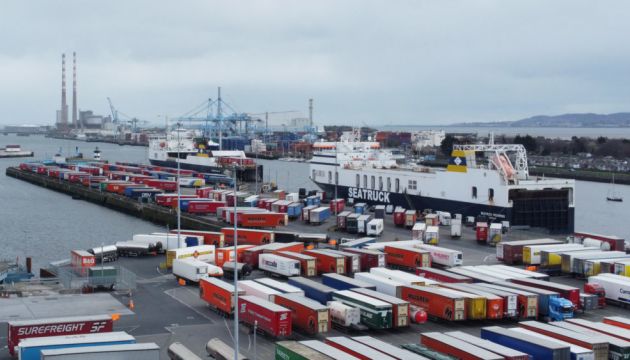The Dublin Port Company’s annual report shows that the company recorded the €48.5 million pre-tax profit as revenues rose by 18% from €85.7 million to €101.47 million.
The port company’s profits were boosted by an exceptional €10 million payment from a 1999 land development deal with Earlsfort East Point and Eastpoint (Development) Two Ltd for the development of office accommodation on 14 acres of land adjoining the East Point Business Park.
The report shows that the amount spent on staff hospitality increased from €71,000 to €100,000 while the spend on client hospitality declined from €106,000 to €42,000.
In his report, chairperson of Dublin Port Company, Jerry Grant stated that total throughput for 2022 amounted to 36.8m tonnes representing an increase of 1.8m tonnes or 5.2% on 2021.
Robust performance
He said: "This is a particularly robust performance given the challenges presented by Brexit and Covid-19 over the previous two years, together with the general economic environment in 2022 as a result of worldwide inflationary pressures which impacted consumer spending in the latter half of the year.”
Mr Grant said that overall throughput is back to within 3.6 per cent of the tonnage recorded in the port’s record year in 2019, pre-Brexit and pre-Covid.
He said that “there has also been a significant shift in trade patterns post-Brexit. In this regard RoRo volumes on direct European services have increased by 64.4 per cent over 2019 levels while volumes on direct U.K. services are down by 17.8 per cent".
The directors do not propose to pay a final dividend.
The port company’s EBITDA (Earnings before Interest, Tax, Depreciation and Amortisation) amounted to €59.3 million representing a 21.7% increase on 2021.
In his report, Dublin Port chief executive Barry O’Connell reveals that the port's costs last year include a spend of €3.7 million on professional fees on the 3FM Project which is the third and final Masterplan project needed to complete the development of Dublin Port and bring it to its ultimate and final capacity by 2040.
Mr O’Connell also reveals that the company's profits were hit by higher insurance costs of €700,000 and energy costs of €600,000.
Despite those one-off and higher costs, the Dublin Port Company's operating profits of €44.2 million were 25 per cent higher than in 2021.
The port company’s taxation charge for the year was €7.2m compared to €4.0m in 2021 and the increase was mainly driven by tax arising on the exceptional receipt of €10m for the East Point Business Park deal.
On the port company’s projected 2023 performance, Mr O’Connell states that “we have taken a reasonably conservative view and budgeted for an overall growth rate of 2.4 per cent”.
Capital Investment in 2023 is expected to rise to €87 million from €48m in 2022.
Mr O’Connell said the company is seeking the return of at least half of the 14.6 hectares of port lands given over to facilitate the border inspection operations of Customs and the Department of Agriculture in the run-up to Brexit.
He said: “This is a critical challenge if we are to mitigate the already emerging capacity pinch points."
The profits recorded last year resulted in accumulated profits of €566.32 million at the end of December. Cash funds totalled €227.8 million.
The pay-packet for the post of ceo last year called €231,000 made up of salary of €162,000, €61,000 in pension contributions and fees of €8,000.
Numbers employed totalled 150 and staff costs totalled €15.68 million, with 35 staff earning over €100,000 including six earning between €150,000 and €200,000.
The Dublin Port Company last year spent €100,000 on 'staff hospitality' as pre-tax profits at the firm increased by 62% to €48.5 million on the back of record revenues.







